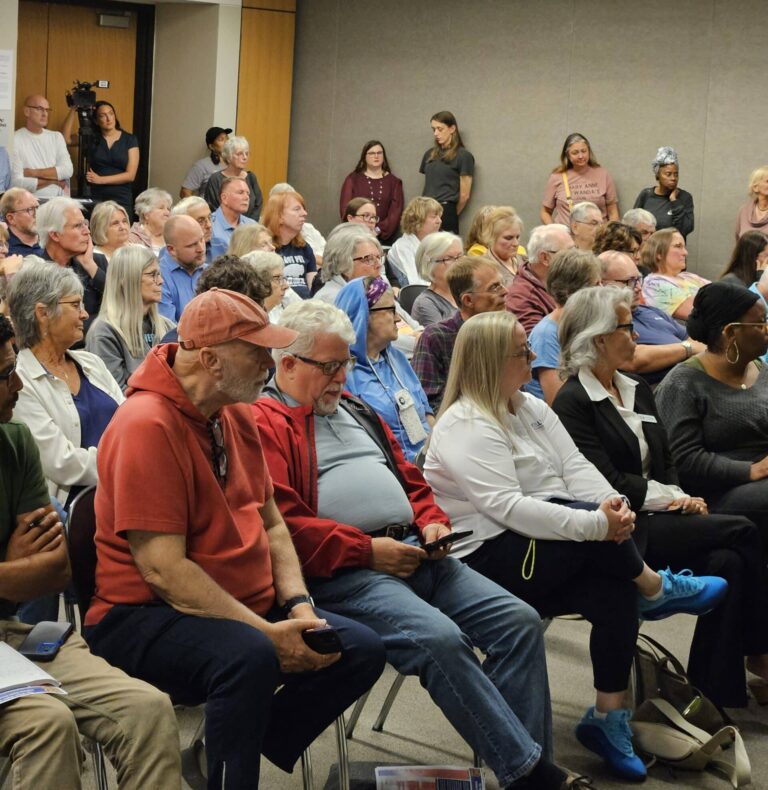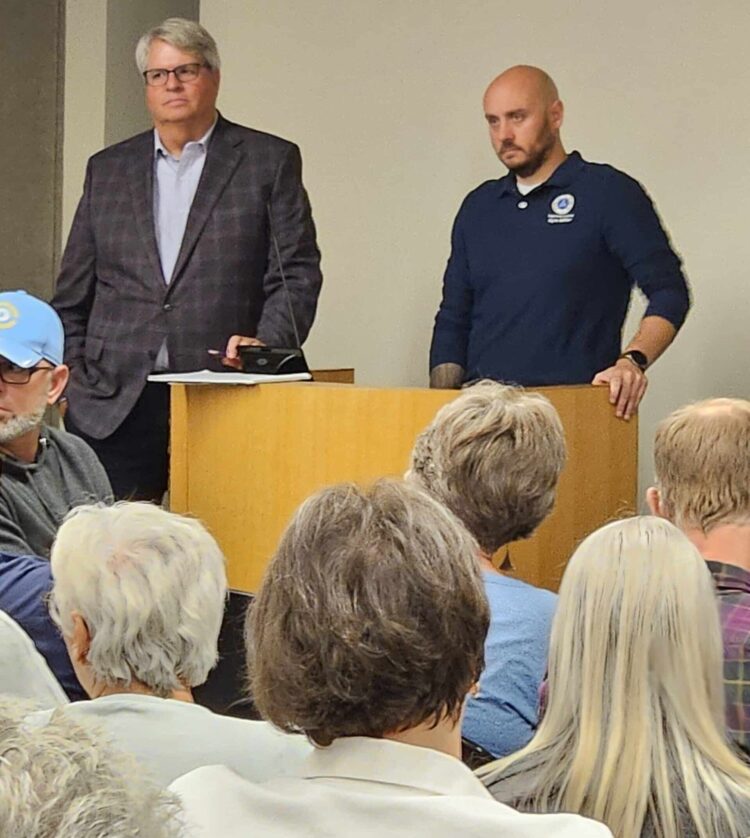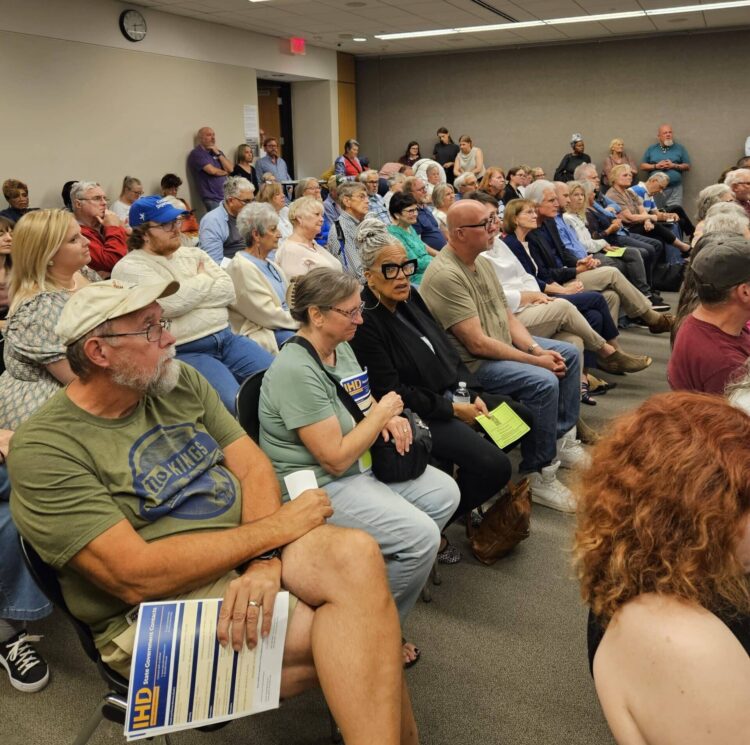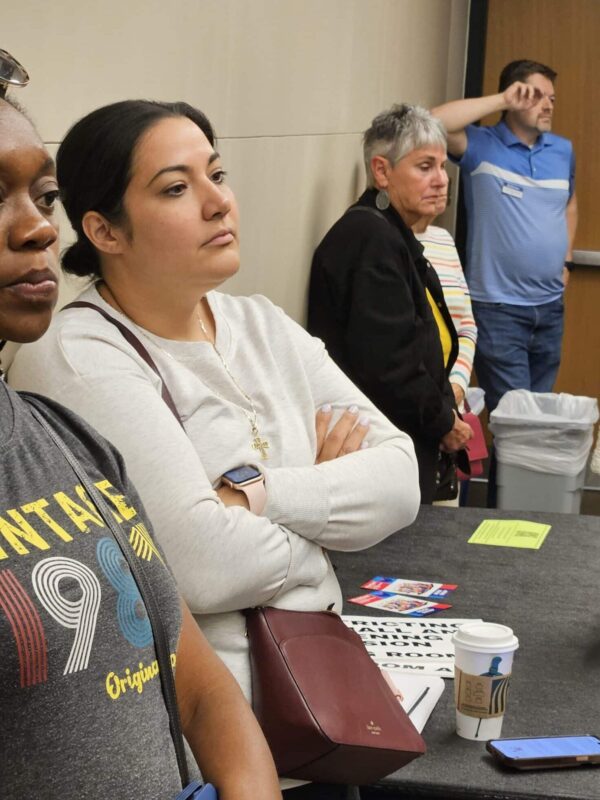
By Marilyn Odendahl
The Indiana Citizen
September 11, 2025
At a town hall in Fort Wayne on Tuesday evening, the crowd was angry about the potential for Indiana to redistrict this year and frustrated that the only way for them to push back was to call, text, or email their state lawmakers.
“We’re here to find out what we can do other than making these phone calls,” one woman said.
Indiana House Minority Leader Phil GiaQuinta and Rep. Kyle Miller, both Democrats who represent portions of Fort Wayne, hosted the community meeting at the Allen County Public Library. The crowd of mostly white, middle-aged individuals filled all seven rows of seats, forcing others to stand along the walls of the meeting room. As the two representatives answered questions about redistricting and the legislative process, the group was quiet and attentive, but they would occasionally applaud, groan and interject with things like, “Fight fire with fire.”
The Hoosier State is being pressured by the Trump administration to redraw its congressional districts. Redrawing the state legislative and congressional district maps usually is done once a decade after the U.S. Census, but President Donald Trump wants red-leaning states like Indiana to redistrict now to bolster Republican candidates and increase the GOP’s majority in the U.S. House in the 2026 midterm elections.
Redistricting was discussed when Vice President JD Vance visited with Gov. Mike Braun and Republican legislative leaders at the Statehouse last month and when several members of the state’s GOP caucus recently flew to Washington, D.C., to meet with federal officials at the White House.
Overwhelmingly the people attending the Fort Wayne town hall were opposed to a mid-decade redistricting and many asked what they could do to stop the Republican supermajority in the Indiana General Assembly from redrawing the congressional districts. GiaQuinta and Miller repeatedly told the crowd to talk to their family and friends about the redistricting fight and to contact their state representatives and senators.
“Except they don’t respond,” someone said while the others in the group grumbled and added, “That’s right.”
“They do,” GiaQuinta said. “They do read (the messages).”

The minority leader pointed out that because Democrats are so few in the Statehouse, they have little power to prevent a special session or block any new maps. They are a superminority so they cannot stop the redistricting process altogether by walking out of the legislature as Democratic lawmakers in Texas did.
Currently, Hoosier Democrats are trying to rally public opposition to mid-decade redistricting. The minority party is hosting town halls and community meetings to inform Hoosiers about the Republican campaign to get Indiana to reconfigure its congressional maps and explain how they can show their strong opposition. Even so, GiaQuinta sympathized with the audience’s frustration with what seems to be the standard response to anything – call, text and email lawmakers.
“I will tell you just continue doing it, because there’s enough folks on the other side of the aisle … that tend to vote Independent or Republican that are also going to do it, too,” GiaQuinta said. “So you, combining with what other folks are going to do, I think is going to be very helpful.”
La’Kendra Deitche, president of the Allen County Stonewall Democrats, pressed the representatives about their response.
Deitche noted that Black women have been identified as a strong voting block who were key to several election victories, including Barack Obama’s election as president in 2008. She said she was tired of fighting only to now be facing a possible redistricting that, she said, was aimed at suppressing the votes of minorities.
“This is a racial problem,” Deitche said of the mid-decade redistricting. “This is (all about) race. That’s all it is and I’m sick of it, so when are you all going to fix it?”
Miller replied that as a superminority, sometimes all the Democratic lawmakers in Indiana have is their collective voice. During a normal legislative session, Democrats can attack the flaws in bills during committee hearings and vigorously debate when the measures are called to the floor for second and third readings. Although they cannot always stop a bill’s progress, Democrats can slow the process and highlight problems or potential harmful impacts of a bill, he said.
“We’re just as frustrated,” Miller said. “We’re stuck. We’re stuck in a system that isn’t kind to us. And we’re doing all we can to push back on a lot of this stuff, to make our voices heard. We are a superminority and so sometimes all we have is our voice.”
GiaQuinta and Miller said developing a strategy for opposing any redrawing of the maps if a special session is convened is difficult at this point because the Republican leadership at the Statehouse could suspend the legislative rules and consolidate the normally weeks-long process into a single day.

The two Democrats told the Fort Wayne audience that Republicans might use Organization Day, which typically happens in November and is the official start to the General Assembly’s session, to redistrict. Miller noted that holding a special session on the opening day would insert a lot of division and discord into what is usually a time of civility and collegiality.
However, if the Org Day agenda includes voting on redrawn congressional maps, Miller said, the Democratic caucus in the Indiana House will be on the floor, speaking out against redistricting. They will stretch the session to the early morning hours, he said, and point out that Republicans were spending taxpayer dollars to redo the maps that the GOP supermajority had just redrawn in 2021. Also, the Democrats will be offering amendments to create a record of how Republicans vote on particular issues, he said.
“We are literally in a fight for U.S. democracy,” Miller said of the battle over mid-decade redistricting. “We are quite literally in the fight for American democracy and our way of life and how we want the future for our kids, for our communities, for our state, for our country to be.”
The group began brainstorming over holding an anti-redistricting protest on Org Day. They talked about the strong message that would be sent by having massive crowds at the Statehouse, yelling “Hell no, hell no.”
GiaQuinta did not dismiss the idea. He pointed to the Go Red for Ed Action Day in 2019, which brought thousands of teachers from across Indiana to the Statehouse and resulted in a bill being introduced to increase teacher pay.

Sandra Garza, founder of Fuerza Unida, a grassroots Latino-led organization formed to civically engage the Latino community in Fort Wayne, asked GiaQuinta and Miller to be clear about the true purpose of redistricting when they talk to their constituents and their legislative colleagues. She said the Democrats need to target their message to minorities, who already feel underrepresented and believe their votes do not count. Black and brown people must be included in the conversation, she said, because redistricting could make their votes count even less.
“White supremacy is alive and well,” Garza said, adding the goal of redistricting is the same as the goals of the Immigration and Customs Enforcement raids and the deployment of National Guard troops into American cities, which is to “suppress people of color.”
Taylor Brantley, of the Allen County Young Democrats and Count US IN, reminded GiaQuinta and Miller about the concerns of ordinary Hoosiers. She said people are tired of politics and of elected officials who just want more power and money.
“We want to see actual conversations about rising housing costs,” Brantley said. “Youth can barely afford to buy places to live, whereas 10 or 20 years ago, that wasn’t a thing. We’re just really wanting to see actual laws passed for people in their community, people of youth, people under 40, people who are disabled, Black, brown. We just know that this is really just a power grab.”
GiaQuinta agreed, saying a special session could be called to address the issues directly impacting Hoosiers. He said the state is in the middle of a child-care crisis, a workforce crisis, a housing crisis and a health-care crisis with people potentially getting kicked off the Medicaid rolls. A special session, he said, should focus on the “extremely important things that Hoosiers are actually being affected by and not how to best keep one party in power.”
Andrenelle Montgomery, owner of a licensed day-care center in Fort Wayne serving 3- to 12-year-olds, is bracing for the impact of one of those issues – the state’s cuts to child-care subsidies. Outside of the town hall, she scrolled through a chart on her phone that showed the new reduced reimbursements and said parents are not thinking about redistricting because they are worried about how they are going to get the extra money to pay for child care.
She believes the lower reimbursement rates will ultimately force her to close her 28-year-old business, which, she said, has taken care of youngsters who grew up to be doctors, nurses, and lawyers.
Montgomery told the town hall attendees that getting people to be civically engaged and vote starts with ensuring they have a stable childhood that teaches them how to be good citizens. But with the legislature’s leaders seemingly unwilling to rethink the funding cuts, she is no longer relying on lawmakers hearing her voice.
“I am asking everyone here to pray,” Montgomery said, “for me as well as the children as well as other providers, because we are definitely under attack.”
Dwight Adams, an editor and writer based in Indianapolis, edited this article. He is a former content editor, copy editor and digital producer at The Indianapolis Star and IndyStar.com, and worked as a planner for other newspapers, including the Louisville Courier Journal.
The Indiana Citizen is a nonpartisan, nonprofit platform dedicated to increasing the number of informed and engaged Hoosier citizens. We are operated by the Indiana Citizen Education Foundation, Inc., a 501(c)(3) public charity. For questions about the story, contact Marilyn Odendahl at marilyn.odendahl@indianacitizen.org.